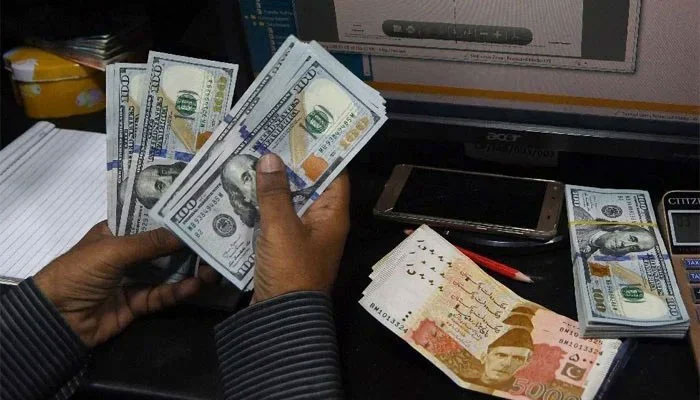Rupee continues to sink, shed 0.39% against US dollar in interbank
Pakistani rupee closed at 200.93 against the US dollar in the interbank market
KARACHI: The Pakistani rupee on Monday maintained its downward streak and dropped to an all-time low of Rs200.93 in the interbank market.
According to the data released by the central bank the local unit further plummeted by 0.39% against the greenback compared to its last close of 200.14.
The dollar had hit a double century and busted all previous records to breach the Rs200-threshold in the interbank market on Thursday.
In the open market, the rupee was sold at 202.25 against the greenback, rates released by the Forex Association of Pakistan showed. However, some dealers are selling it at an even higher rate in the market.
The local currency remained under pressure as the political uncertainty heightened after the former prime minister Imran Khan announced the date for a long march.
“If Imran Khan starts a long march towards Islamabad, it will teeter the country into chaos,” a currency dealer said. “This would further erode investor confidence in the country’s economy and currency.”
Moreover, the market remained sceptical about whether the government will successfully complete the negotiations with the International Monetary Fund (IMF) to revive a $6 billion loan programme or not as it hasn’t announced the removal of fuel and power subsidies.
Meanwhile, investors also awaited the monetary policy announcement by the central bank.
Since the beginning of this fiscal year (July 1, 2021) to date, the rupee has collectively dropped by a massive 27.54% (or Rs43.39) compared to the previous fiscal year’s close at Rs157.54.
The rupee has maintained a downward trend for the last 13 months. It has lost 31.95% (or Rs48.66) to date, compared to the record high of Rs152.27 recorded in May 2021.
Last week, the coalition government had imposed a ban on the import of luxury and non-essential items. This decision was taken in the light of recent dollar slippage, rising current account deficit and decline in the country’s foreign exchange reserves.
The government said these measures would have a positive impact on the current account deficit and will help in controlling the slippage of the rupee against the dollar.
However, analysts believe that these measures are insufficient and might lead to a further increase in smuggling via western borders.
-
Bitcoin crashes below $63K as regulatory pressure and market fears grow
-
Bitwise Crypto Industry innovators ETF: What investors should do in 2026?
-
Nintendo shares slide again as momentum fears grow
-
Gold, silver prices fallen sharply; What’s driving the drop?
-
Gold’s record climb: Experts question if its safety is ‘overstated’
-
Dubai unveils plans to construct street built with real gold
-
Netflix slams Paramount’s bid: 'Doesn't pass sniff test’ as Warner battle escalates
-
Ubisoft: Shares plunge amid restructuring plan and wave of games cancellations












